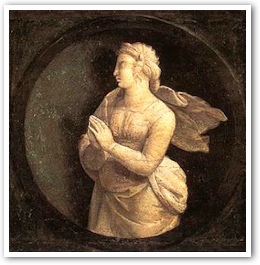There is Only One God
- KENNETH BAKER, S.J.
One salient feature of religion is that there are many different religions and, correspondingly, many different ideas about the nature of God.
 |
With the advent of speedy travel to all corners of the globe and with satellite television news coverage daily from almost every country, we are today more than ever before aware of the great differences in religious belief.
In the Creed we profess belief in one God. What does the Church mean by this open confession of one God to the exclusion of all others? We are all seeking answers to the puzzling questions of our personal existence. We are especially concerned about where we came from and where we are going. It is natural to man to ask these questions. He has been asking them, according to the record of history and literature, since the beginning of recorded time. It can also be shown from philosophy that man is by nature a questioning being. Unless impeded by others or by his own physical inability, man naturally asks questions about his own existence and the existence of the world in which he lives. And questions about existence necessarily lead to the question about God.
In the course of human history many different answers have been given to these questions. Fundamentally the answers are of three kinds: 1) God is immanent in the world and so identified with it; 2) God is transcendent and so completely separated from the world; 3) God is both immanent and transcendent but not in exactly the same way.
Because of the painful problem of evil, some (such as the Manicheans) have posited two gods caught in an external struggle one, the source of good in the world, and the other, the source of evil. In this view, at different times one or the other is thought to subdue the other.
In the midst of many contrary ideas about God, the Bible says there is only one God the God of Abraham, Isaac and Jacob. Thus we read in Isaiah (44:6): "I am the first and I am the last; there is no God but me." The oneness of God is also taught in Job, chapter 38; Proverbs (8:23-30); Sirach, chapter 24; Wisdom (9:1-3).
In the New Testament St. John reports Jesus as saying: "This is eternal life, that they known thee the only true God, and Jesus Christ whom thou hast sent" (17:3). And St. Paul affirms that there is but "one Lord, one faith, one baptism, one God and Father of all, who is above all, and throughout all, and in all" (Eph 4:5-6).
Dangers to the true faith abound in every age. The chief danger at the present time in our thinking about God is to identify him so completely with the world, and especially with our fellow man, that he becomes in our minds totally immanent to the world. But the Catholic view of God is very precise and nuanced. There is only one God who is the Creator and sustainer of all that exists and nothing exists without him.
The essential elements in the Catholic conception of God are his transcendence, infinity and personality. Through the revelation of Jesus we know that in the inner nature of God there are three Persons Father, Son and Holy Spirit. God keeps everything in existence but he is not identified with any of his creatures. All creatures must be caused by some other being and that implies limitation and dependence. God is absolutely independent and so the source of everything that exists. Thus there can be only one God. The glory of the Christian is to know who the only true God is and to worship him in the Father, in the Son and in the Holy Spirit.
See the index of chapters from Fundamentals of Catholicism which have been reprinted to CERC here.
 This is J. Fraser Field, Founder of CERC. I hope you appreciated this piece. We curate these articles especially for believers like you.
This is J. Fraser Field, Founder of CERC. I hope you appreciated this piece. We curate these articles especially for believers like you.
Please show your appreciation by making a $3 donation. CERC is entirely reader supported.

Acknowledgement
Kenneth Baker, S.J. "There is Only One God." In Fundamentals of Catholicism Vol. 1 Part 1, Chapter 4 (San Francisco: Ignatius Press, 1995), 27-30.
This article reprinted with permission from Father Kenneth Baker, S.J.
The Author

 Father Kenneth Baker, S.J., assumed editorship of Homiletic & Pastoral Review in April 1971 and remained in this position for almost forty years. In 1983 he published a three-volume explanation of the faith called Fundamentals of Catholicism Vol. 1, Creed and Commandments; Vol. 2, God, Trinity, Creation, Christ, Mary; and Vol. 3, Grace, the Church, the Sacraments, Eschatology
Father Kenneth Baker, S.J., assumed editorship of Homiletic & Pastoral Review in April 1971 and remained in this position for almost forty years. In 1983 he published a three-volume explanation of the faith called Fundamentals of Catholicism Vol. 1, Creed and Commandments; Vol. 2, God, Trinity, Creation, Christ, Mary; and Vol. 3, Grace, the Church, the Sacraments, Eschatology


